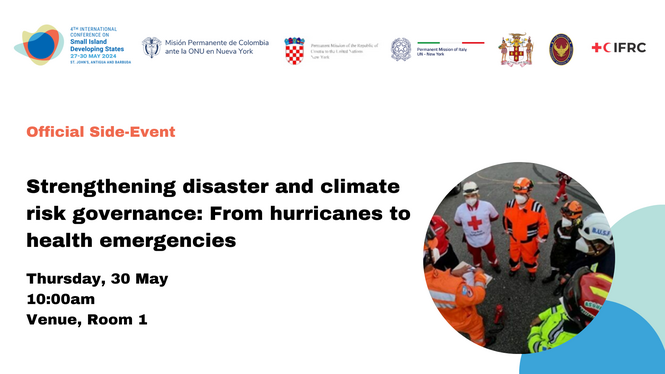
Co-organizers: The Core Group of States for the Protection of Persons in the Event of Disasters (Colombia, Croatia, Italy, Jamaica, Nigeria, and Thailand) and the International Federation of Red Cross and Red Crescent Societies (IFRC)
Thursday, 30 May | 10:00am | Room 1
Small Island developing states (SIDS) experience the highest frequency of disasters in the world. Both natural and anthropogenic hazards, such as hurricanes and cyclones, sea-level rise, earthquakes, tsunamis, and violent storms, as well as health emergencies, can lead to loss of life, the destruction or damage of homes, critical infrastructure, and culture, and high economic costs. They reverse development successes and can result in communities stuck in a cycle of ‘response and recovery’ to ever-looming disasters.
While SIDS face high levels of exposure and particular vulnerabilities, we know that not all hazards have to be disasters. As recognized in the new Antigua and Barbuda Agenda for SIDS (ABAS), the Samoa Pathway for Small Island Developing States, the Sustainable Development Goals, the Sendai Framework for Disaster Risk Reduction’s Pillar 2, and resolutions of the Red Cross and Red Crescent, if countries invest in effective multi-hazard risk governance that supports governments at all levels, authorities will be better able to anticipate, prepare for, and build resiliency against hazards and, ultimately, protect communities and people. In a similar sense, the First Global Stocktake recognizes the importance of “comprehensive risk management” as part of “national efforts to respond to loss and damage.
Multi-hazard risk management laws, policies, and plans are often invisible foundations that define roles and responsibilities for government authorities, humanitarians, and other actors before, during, and after a disaster, shape the capacities of authorities, and, importantly, protect the human rights and dignity of persons in vulnerable situations. These legal frameworks integrate approaches to disaster risk reduction (DRR) and climate adaptation and facilitate risk management activities such as hazard mapping, risk assessments, early warning and early action systems and create and enabling environment for nature-based solutions.
Throughout the last 20 years, the IFRC network has been supporting SIDS to develop, revise, and review their multi-hazard risk management laws, policies, and plans. Fortunately, significant improvements have been made at the domestic level, in countries from Fiji to Trinidad and Tobago, but there is still room to sharpen these legal frameworks at all levels. In addition to the foregoing, this year, in particular, governments have an opportunity to strengthen multi-hazard risk governance and reduce gaps at the international level with the ongoing discussions around the International Law Commission’s draft articles on the Protection of Persons in the Event of Disasters (PPED).
This side-event will bring together governments at all levels, DRR, climate, development, and human rights actors, humanitarians, and civil society organizations to achieve the following objectives:
- Support the implementation of the ABAS and improve the development, revision, and review of multi-hazard risk governance at all levels, including legal and policy frameworks in terms of scaling up investment in prevention, preparedness and early warning, as well as in capacity building and technical expertise, all which better prepare and protect communities and people from hazards;
- Educate, advocate, and build momentum for the importance of an international legal framework for the protection of persons in disasters, including through the sharing of best practices and gaps;
- Demonstrate through examples how coherence and alignment between disaster risk management and climate adaptation laws, policies, and plans support multi-hazard risk reduction, the protection of persons in vulnerable situations and synergies between processes, such as the ILC’s draft articles on PPED and the Santiago Network and set up of the Loss and Damage Fund and funding arrangement.
Programme
Moderator: Ms. Fine Arnold, Secretary-General of the Cook Islands Red Cross Society (5 mins)
Opening Remarks (10 mins)
- H.E. Mr. Thoriq Ibrahim, Minister of Climate Change, Environment and Energy, The Maldives
- Mr. Xavier Castellanos Mosquera, Under Secretary-General for National Society Development and Operations Coordination, IFRC
Two Fireside Chats: Domestic and International Disaster and Climate Risk Governance
1). Domestic Fireside Chat (20 mins + Q&A)
- Ms. Vasiti Soko, Director, National Disaster Management Office, Figi
- Dr. Kawol, Senior Chief Executive of the Ministry of Local Government and Disaster Risk Management, Mauritius
- Ms. Lilia Bowman, Director-General, Belize Red Cross
- TBC
2). International Fireside Chat (20 mins +Q&A)
- Professor Francesco Corvaro, Special Envoy for Climate Change, Italy
- Ms. Jessie Jordan, Coordinator for Disaster Laws, Americas, IFRC
- Mr. Ronald Jackson, Head of the Disaster Risk Reduction, Recovery for Building Resilience, United Nations Development Programme (UNDP)
Closing Remarks (4 mins)
- Mr. Kamal Kishore, Assistant Secretary-General and Special Representative of the Secretary-General for Disaster Risk Reduction, UN Office for Disaster Risk Reduction (UNDRR)